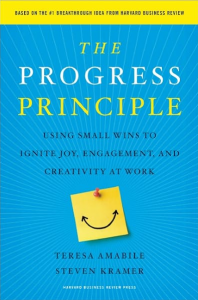So I want to introduce you today to a groovy new book by Harvard Professor Teresa Amabile and her equally accomplished husband, Steven Kramer. It’s called The Progress Principle, and I think it contains a lot of important lessons for project managers.
The primary focus of the book is a concept called “inner work life”. Indeed, the book’s subtitle says, “using small wins to ignite joy, engagement, and creativity at work”. Regular readers know this is an topic I’m very passionate about, so I’m thrilled to review the book here.

What is this “inner work life”, anyway? Basically, it’s the sense of identity everyone possesses in regards to the work that they do. This goes beyond the 9 to 5 grind, or the sometimes petty rules of the office. A rich inner work life suggests an overarching belief that by getting up every morning and going about your business, you are performing something meaningful. A positive inner work life can inspire passion, creativity and enthusiasm. Inner work life is the driving force behind the level of ownership one takes in their job performance (cue my good friend Rick Valerga).
How often do you find yourself solving work problems in the shower? Or talking to your vendors late at night? When you meet colleagues for drinks, do you find your conversation ebbs and flows between relaxing conversation and taking care of real business? Our inner work lives are more than just the mechanics of going to work every day.
According to Amabile and Kramer:
- “Inner work life influences people’s performance on four dimensions: creativity, productivity, work commitment, and collegiality. We call this the inner work life effect.”
- “Inner work life matters for companies because, no matter how brilliant a company’s strategy might be, the strategy’s execution depends on great performance by people inside the organization.”
- “The primacy of progress among the key three influences on inner work life is what we call the progress principle: of all the positive events that influence inner work life, the single most powerful is progress in meaningful work.”
Are these concepts ringing a bell? They sound a lot like those behaviours we actively look for in our project teams!
Teresa Amabile delivers an amazing talk about the “disengagement crisis” plaguing modern work culture.
The authors take us through some compelling territory. For example, they review the fate of “Karpenter Corporation”. This was a fifty year old company that found its way to a list of the “ten most innovative, successful companies in America”. In the space of four short years, a new executive management drove the company straight into the ground. Plummeting from the intoxicating heights of success, employees one day found themselves agog watching their office furniture sold at auction.
The culprit?
It’s difficult to point one finger at a situation like this. But the authors identified serious damage to the inner work lives of employees. Using that as a starting point, they walk us step-by-step through the systematic destruction of one of America’s corporate jewels.
“Waitaminnit, Geoff,” you yell. “This book sounds like it’s meant for top brass, so they don’t put their foot in it at a fiscal year-end presentation!”
Well, that may be one application for the information contained in The Progress Principle. But if you’re here, you’re interested in project management at least on some level. And I can tell you that the tenets Amabile and Kramer espouse in this book are just as applicable to managing a project as they are to managing a company.
The only difference I can see, is that corporate executives generally have much broader time horizons than we do to get things right. If anything, that makes The Progress Principle even more relevant to project managers. If you don’t have a strategy to get the most out of your people going into your project, you’ll find yourself short of resources by the time you realize you missed something. And as we all know, hitting the “project reset button” is pretty damn expensive.
You can get The Progress Principle in both paperback and Kindle versions. I highly recommend you go out and pick yourself up a copy today!




